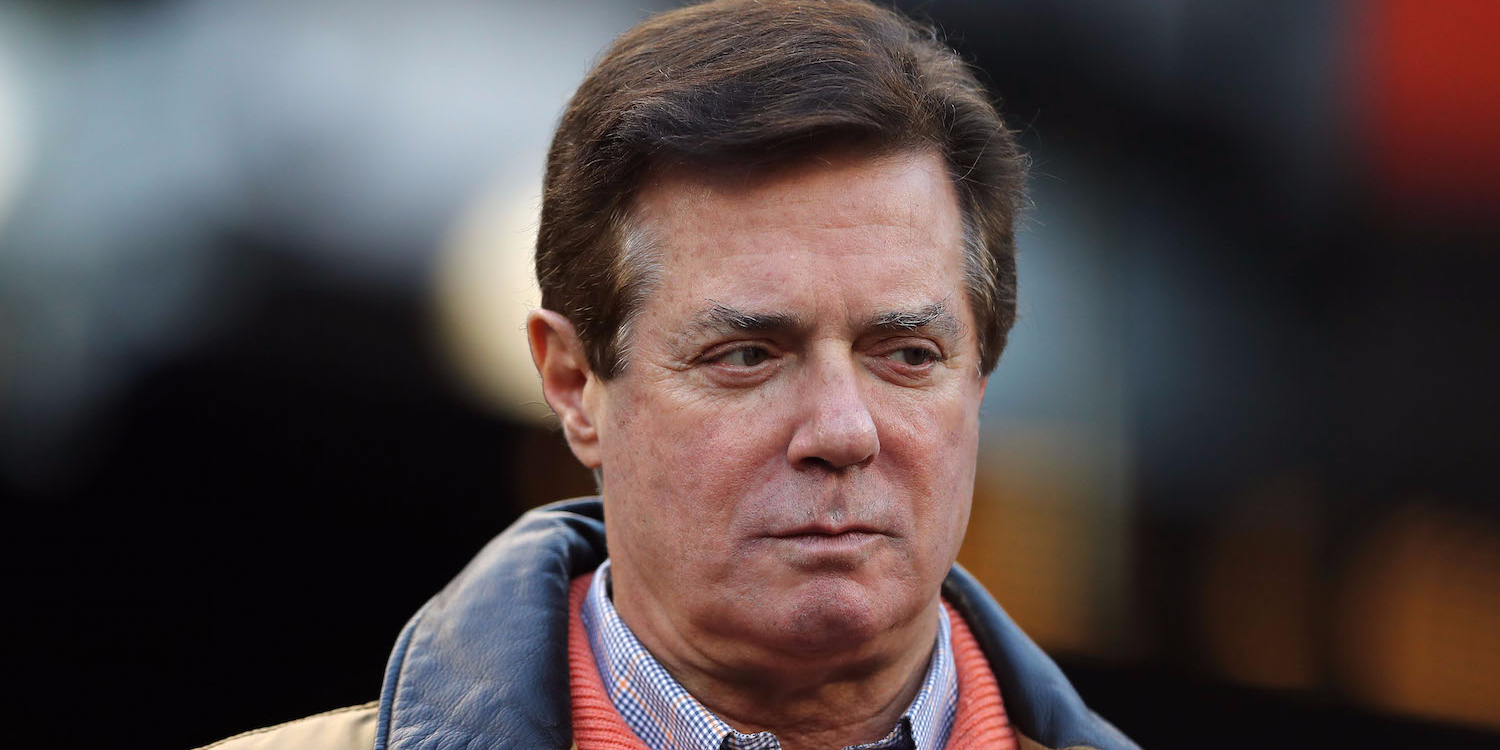- Paul Manafort, the former Trump campaign chairman, is suing the special counsel Robert Mueller, Deputy Attorney General Rod Rosenstein, and the US Department of Justice.
- Manafort is accusing Rosenstein of exceeding his power by appointing Mueller to investigate the campaign’s ties to Russia and “any matters that arose or may arise directly from” the initial inquiry.
- Manafort pleaded not guilty in October to 12 counts related to money laundering, tax fraud, and conspiracy against the US.
Paul Manafort, the former Trump campaign chairman, on Wednesday filed a civil lawsuit against the special counsel Robert Mueller, Deputy Attorney General Rod Rosenstein, and the US Department of Justice.
Manafort is accusing Rosenstein of overstepping the scope of his authority by appointing Mueller to investigate not just “links and/or coordination between the Russian government and individuals associated with” the campaign, but “any matters that arose or may arise directly from” the investigation.
The appointment, Manafort’s suit says, “in effect purports to grant Mr. Mueller carte blanche to investigate and pursue criminal charges in connection with anything he stumbles across while investigating, no matter how remote from the specific matter identified as the subject of the Appointment Order.”
A grand jury impaneled by Mueller in October indicted Manafort and his longtime associate Rick Gates on 12 counts related to money laundering, tax fraud, failing to register as foreign agents, and conspiracy against the US.
Manafort said Mueller's looking into his finances and offshore business dealings as early as 2005 went "far beyond" investigating whether the Trump campaign colluded with Russian actors.
He says that because the charges against him are not directly related to collusion, the court should deem them ultra vires - or beyond one's legal power or authority - and "set them aside."

A 'PR move'?
Renato Mariotti, a former federal prosecutor, wrote on Wednesday that it was "an extremely unusual move" for Manafort to file the suit.
"If an indictment can be challenged legally, typically the defendant files a motion to dismiss the indictment as part of the criminal case," Mariotti said.
The case "has almost no chance of success," he said, adding that even if it succeeded, "another federal prosecutor could indict Manafort for the same crimes, so it's a pointless suit."
Patrick Cotter, a former federal prosecutor and longtime white-collar defense attorney, agreed.
"Attempts to argue that federal prosecutors somehow lack authority to charge federal crimes for which a grand jury found probable cause are rare, and I can't recall any such motion succeeding," he said.
"This seems like a PR move made to continue the 'Mueller is somehow illegitimate so pay no attention to any evidence of crimes he finds' strategy," he added. "I do not think it is a serious legal motion."
Former federal prosecutor Jeffrey Cramer echoed that point, saying Manafort's suit was a "long shot."
"The Special Counsel jurisdiction is mostly limited by the Attorney General's Review," said Cramer, who is now the Managing Director at Berkeley Research Group. In this case, Rosenstein is responsible for reviewing Mueller's efforts because Attorney General Jeff Sessions recused himself from the investigation in March.
"We know from [Rosenstein's] recent testimony that he has been fulfilling his responsibility in reviewing the Special Counsel's investigation. It is absurd to think Mueller should have closed his eyes when evidence was found as to massive money laundering and related charges," Cramer added. "This complaint has no chance of success. Defendants don't get to complain that their crimes should have remained concealed."
Manafort's murky past

When he joined the campaign in March 2016, Manafort was known to have worked as a top consultant to Viktor Yanukovych, the former Ukrainian president and pro-Russia strongman. Manafort is widely credited with helping him win the country's election in 2010.
As part of his investigation, Mueller also in late August subpoenaed Mercury Public Affairs, a lobbying firm with which Manafort was associated.
Mueller's team asked Mercury about public-relations work it had conducted at Manafort's request for the European Centre for a Modern Ukraine, The Washington Post reported.
The organization's stated goal is to foster closer ties between Ukraine and the European Union, as well as the US. Its founding president, however, was Leonid Kozhara, a senior member of parliament for the Party of Regions, the pro-Russia political party of Yanukovych.
Mercury worked with Podesta Group - the now defunct lobbying firm led by Anthony Podesta, the brother of John Podesta who is also a subject of Mueller's investigation - on the Ukraine lobbying project.
The firms did not register as foreign agents at the time, saying they were working for a nonprofit and not a foreign government or political party, The Post reported.
Both firms recently registered retroactively, however, acknowledging that the Party of Regions benefited from their work.
Manafort was first brought onto the Trump campaign to manage delegate operations. He was promoted to campaign chairman and chief strategist two months later.
Manafort resigned from the campaign in August, three days after The New York Times reported that the Party of Regions had earmarked $12.7 million in undisclosed cash payments for his work consulting for the party from 2007 to 2012.
Manafort has been associated with at least 15 bank accounts and 10 companies in Cyprus dating to 2007, NBC News reported in March, and the FBI has issued grand-jury subpoenas to several banks for Manafort's records. Gates' name appears on documents linked to many of those Cyprus companies, according to The Times.
BuzzFeed also reported in October that the FBI was looking at 13 wire transfers made by Manafort-linked offshore companies in 2012 and 2013.
